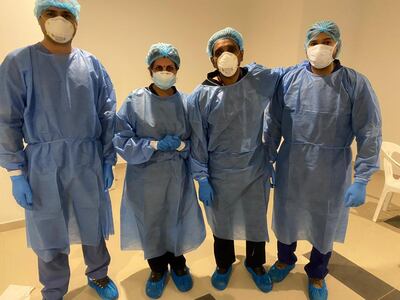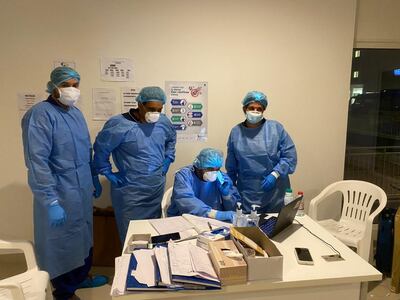Coronavirus patients are being treated by volunteer doctors and nurses in a 500-bed isolation centre in Dubai’s Warsan neighbourhood.
The facility is staffed by about eight doctors and 12 nurses, who wear a double layer of personal protective equipment consisting of face masks, gloves and shoe covers when attending to patients.
Everyone being treated at the centre is mild to moderately ill, but ambulances are on standby to transport anyone whose condition worsens to intensive care units in designated government hospitals.
The centre is allocated cases by local authorities and began admitting patients on Saturday.
Healthcare workers volunteered their services to help on the invitation of the Indian Consulate in Dubai.
"This supplements Dubai and the UAE's efforts," Mr Vipul, the Indian Consul General told The National.
"We have provided a team of doctors and nurses to look after the patients in one building in Warsan."
The facility was made possible by contributions from the Indian community, with plans for a second 500-bed unit when required.
It is understood that several hundred patients are being monitored by private health care providers working with local authorities in multiple isolation units within a compound of buildings in Warsan.
A doctor couple is among those who have volunteered their services to fight the Covid-19 outbreak.
Their enthusiasm reflects the zeal of the medical fraternity across the country.
Dr JS Rajkumar and his wife Chitrakala lead the team in one isolation centre, which has six rooms set aside as emergency and administration stations.
“This is an incredible effort to decompress the load on the system by getting patients to field hospitals,” said Dr Rajkumar, a general and laparoscopic surgeon.
“That’s the way to handle a pandemic. This is well structured and the support from local authorities is fantastic.”
The Indian doctor operates in Medstar Healthcare in Dubai and is the founder of the Lifeline Hospital group with 23 clinics in southern India’s Chennai state.
Inside the infection zone, patients are asked remain in their room with food and water left outside the door to minimise contact.
The air-conditioned units have music and free Wi-Fi so patients can stay connected with their families.
“We will ensure patients are taken care of and are comfortable. This is not acute ICU stuff,” the 57-year-old doctor said.
Emergency services are called if a patient’s condition deteriorates with a ‘wet cough’ and temperature of more than 38°C.
“Taking a decision in a few minutes can change somebody’s life,” Dr Rajkumar said.
“There is a fantastic framework in play because ambulances are on standby so we can grab the patients and move them to a hospital immediately.”
Medical staff wear blue suits, an N95 mask covered by a regular surgical mask, gloves and shoe covers.
When attending to patients, doctors and nurses add an extra layer of yellow overalls, an additional mask, a visor and gloves.
The second layer is stripped off after each patient examination.
“Anytime we have any form of contact with a patient we peel off the outer layer and wear one more when we see the next patient and then remove that,” he said.
“This is to reduce the transmissibility. The main reason is because there is no doubt here that all the patients are positive.”
The doctor and his wife Dr Chitrakala Rajkumar, an internal medicine physician, responded to a call from the Indian consulate asking for volunteer medical professionals.
Across the country, residents have offered their help when appeals have gone out from the UAE government.
The couple live alone in Dubai as their children and grandchildren are in India.
They adhere to strict isolation rules and stay home after completing shifts at the isolation centre.
Meanwhile, other staff live in accommodation within the facility to prevent exposing their families to potential infection.
Apart from the physical care, patients can also require counselling.
“It can get lonely and people get depressed and lose confidence,” Dr Chitrakala said.
“Health care workers have to be extra positive so we actually infuse positivity in patients.
"It’s emotional support they need so we all have to be mentally strong.
“[This is] a global disaster like nothing we have seen in our lifetime so we want do our part and pitch in. We cannot stand aside and not help.”
How to help
Send “thenational” to the following numbers or call the hotline on: 0502955999
2289 – Dh10
2252 – Dh 50
6025 – Dh20
6027 – Dh 100
6026 – Dh 200
T20 WORLD CUP QUALIFIER
Results
UAE beat Nigeria by five wickets
Hong Kong beat Canada by 32 runs
Friday fixtures
10am, Tolerance Oval, Abu Dhabi – Ireland v Jersey
7.30pm, Zayed Cricket Stadium, Abu Dhabi – Canada v Oman
Your rights as an employee
The government has taken an increasingly tough line against companies that fail to pay employees on time. Three years ago, the Cabinet passed a decree allowing the government to halt the granting of work permits to companies with wage backlogs.
The new measures passed by the Cabinet in 2016 were an update to the Wage Protection System, which is in place to track whether a company pays its employees on time or not.
If wages are 10 days late, the new measures kick in and the company is alerted it is in breach of labour rules. If wages remain unpaid for a total of 16 days, the authorities can cancel work permits, effectively shutting off operations. Fines of up to Dh5,000 per unpaid employee follow after 60 days.
Despite those measures, late payments remain an issue, particularly in the construction sector. Smaller contractors, such as electrical, plumbing and fit-out businesses, often blame the bigger companies that hire them for wages being late.
The authorities have urged employees to report their companies at the labour ministry or Tawafuq service centres — there are 15 in Abu Dhabi.
UAE players with central contracts
Rohan Mustafa, Ashfaq Ahmed, Chirag Suri, Rameez Shahzad, Shaiman Anwar, Adnan Mufti, Mohammed Usman, Ghulam Shabbir, Ahmed Raza, Qadeer Ahmed, Amir Hayat, Mohammed Naveed and Imran Haider.
All Black 39-12 British & Irish Lions
How the bonus system works
The two riders are among several riders in the UAE to receive the top payment of £10,000 under the Thank You Fund of £16 million (Dh80m), which was announced in conjunction with Deliveroo's £8 billion (Dh40bn) stock market listing earlier this year.
The £10,000 (Dh50,000) payment is made to those riders who have completed the highest number of orders in each market.
There are also riders who will receive payments of £1,000 (Dh5,000) and £500 (Dh2,500).
All riders who have worked with Deliveroo for at least one year and completed 2,000 orders will receive £200 (Dh1,000), the company said when it announced the scheme.
Conflict, drought, famine
Estimates of the number of deaths caused by the famine range from 400,000 to 1 million, according to a document prepared for the UK House of Lords in 2024.
It has been claimed that the policies of the Ethiopian government, which took control after deposing Emperor Haile Selassie in a military-led revolution in 1974, contributed to the scale of the famine.
Dr Miriam Bradley, senior lecturer in humanitarian studies at the University of Manchester, has argued that, by the early 1980s, “several government policies combined to cause, rather than prevent, a famine which lasted from 1983 to 1985. Mengistu’s government imposed Stalinist-model agricultural policies involving forced collectivisation and villagisation [relocation of communities into planned villages].
The West became aware of the catastrophe through a series of BBC News reports by journalist Michael Buerk in October 1984 describing a “biblical famine” and containing graphic images of thousands of people, including children, facing starvation.
Band Aid
Bob Geldof, singer with the Irish rock group The Boomtown Rats, formed Band Aid in response to the horrific images shown in the news broadcasts.
With Midge Ure of the band Ultravox, he wrote the hit charity single Do They Know it’s Christmas in December 1984, featuring a string of high-profile musicians.
Following the single’s success, the idea to stage a rock concert evolved.
Live Aid was a series of simultaneous concerts that took place at Wembley Stadium in London, John F Kennedy Stadium in Philadelphia, the US, and at various other venues across the world.
The combined event was broadcast to an estimated worldwide audience of 1.5 billion.
Key facilities
- Olympic-size swimming pool with a split bulkhead for multi-use configurations, including water polo and 50m/25m training lanes
- Premier League-standard football pitch
- 400m Olympic running track
- NBA-spec basketball court with auditorium
- 600-seat auditorium
- Spaces for historical and cultural exploration
- An elevated football field that doubles as a helipad
- Specialist robotics and science laboratories
- AR and VR-enabled learning centres
- Disruption Lab and Research Centre for developing entrepreneurial skills














